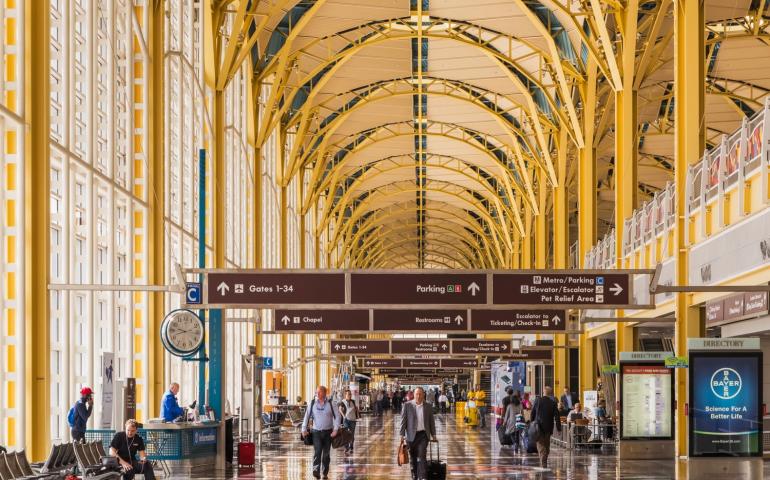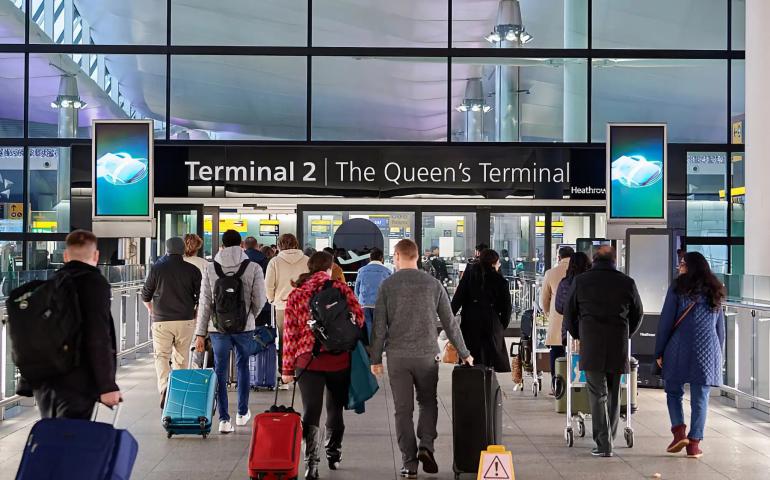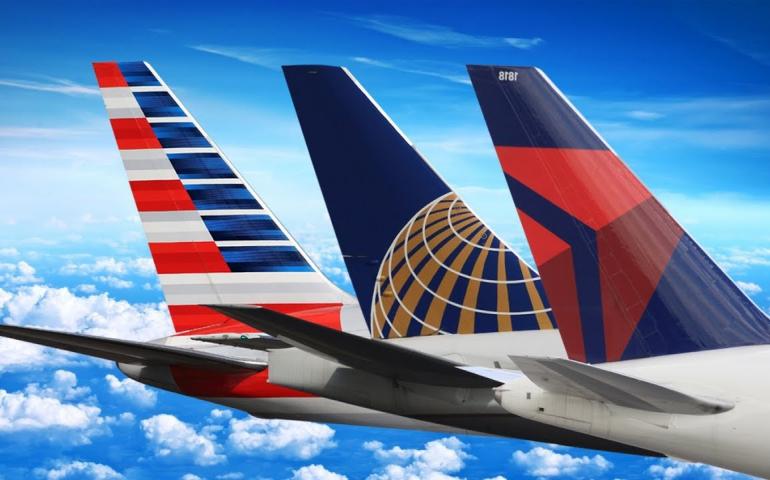
In what position is Mexico? In this crisis, do low-cost carriers have the same opportunities as full service airlines (FSA)?
Carlos Ozores is the Principal, ICF Americas Aviation Lead, he is a specialist in air transport with more than 19 years of experience in aviation strategy and strategic business planning. He advises airline executives and airport operators in the development of strategies and offers support to investors to define investment objectives.
In this exclusive interview, with A21, Carlos analyzes the situation that the air transport industry is facing in Latin America in the midst of the crisis caused by the COVID-19 pandemic. While the situation is discouraging, there are opportunities that airlines can take to stay in the skies.
- What differences are there between the countries that have opened their borders and those that have not?
If on one hand we think of Visiting Friends and Relatives (VFR) and leisure traffic, and business on the other, the ethnic and leisure segments are holding up better.
Mexico and Brazil serve as an example to understand, to a certain extent, what is the potential traffic that can be seen before there is a cure for COVID. In the case of Mexico, we have a market that in the domestic segment is between 40% and 50% below 2019, but if you look at specific airlines it is different.
This crisis, like any crisis, creates opportunities for airlines that have a stronger cash flow, have more cash, are willing to be aggressive, take more risks, and whose business model is better suited to demand segments that are better resisting the crisis.
FSA are suffering the most in this crisis. We do not believe that demand will improve continuously without treatment. There is a theoretical maximum level in this context which is probably what we are seeing today. When September ends, the demand will fall again. Gradually we will see other countries in the region getting closer to where Mexico is today. As other countries open their borders, they are expected to have a similar demand to pre-crisis levels in the domestic market. Where we cannot really glimpse is in the international part because the health protocols have not yet been defined. Many countries remain closed or think of quarantines as the method to ensure health, and quarantine is a brake on recovery.
The only segment of demand that can coexist with quarantine is VFR. Business and leisure trips cannot. Given that the international and intraregional traffic is an important component for airlines such as Copa, Avianca, LATAM, we see that it will take a long time to compose. Before the crisis, COPA was one of the most profitable and successful airlines in the world, but that business model, which was a strength, today is a weakness because they depend 99% on international traffic, they depend on many markets, they have the largest international network in Latin America, and it requires that all countries should be open to generate that connectivity. So the reopening of Copa has been very gradual and it is not even flying every day.
- How long will recovery take?
It is difficult to talk about recovery. We made demand projections from the beginning of the crisis, in May. At that time, we estimated that Latin America, at the regional level, would take between 5 or 6 years to recover to pre-COVID levels, the slowest level of recovery in the world, and this is supported by the economic situation. We had not yet seen the total impact of the COVID but I think the damage justifies this pessimistic perspective. We know that the main airlines in the region, LATAM, Aeroméxico and Avianca are in processes of restructuring, others are renegotiating fleets and we are going to see a smaller industry, yet we believe that the level of recovery at the global level will be slow.
We do not have an estimate of how much aviation will be reduced in the region, but what I can tell you is that many of the full service airlines are projecting reductions in their capacity of between 20 and 30%. Globally, full service carriers will have a fleet reduction of 20% to 30% relative to pre-crisis levels. That is not necessarily the case for an airline like Volaris. The crisis will generate many opportunities for low cost companies. The best positioned airlines are those that have a greater exposure to domestic markets, and point-to-point traffic, that do not require networks, that depend more on VFR and leisure traffic, and that are airlines that have a sufficient cost structure competitiveness to be able to charge less.
If we look at the economic context, it is obvious that there will be a recession and a very difficult situation in the region. In the crisis of 2008, Latin America entered a process of expansion, a boom, thanks to the high prices of commodities and the dynamism of China. It was the best moment for countries like Brazil, Argentina, Peru but that will no longer happen because China no longer grows at the same rate. Latin America depends a lot on raw materials, it does not generate much added value. It is in slow growth, where the challenge is to maintain the middle class because it has expanded a lot in recent years. We believe that airlines, like Volaris, that are able to capture segments with lower rates and with a cost structure that supports these rates will see benefits.
In terms of which countries we think will recover first, Mexico seems a rather optimistic and positive market, because it does not depend on the Chinese economy like the rest of the region. All the economies of South America depend on China, but Mexico is tied to the US, where the government can stimulate a faster recovery. It seems to me that this close relationship in cross-border traffic will give a faster recovery than in the rest of the region.
Brazil has an economy that is related to Argentina and this country has a political crisis. The political situation in Latin America is getting worse and I think Mexico is looking good. Several Caribbean markets that depend on US point-of-sale traffic may recover more quickly because it appears that the US economy will be one of the fastest to recover.
- Is this crisis an opportunity to boost infrastructure?
It is true that before the crisis there was a saturation in many airports, such as Mexico City International Airport, El Dorado (Colombia), Jorge Chavez International Airport (Peru), Aeroparque (Argentina), and Congonhas (Brazil), but with this crisis, the pressure on that infrastructure has decreased. Many of these expansion projects are contractual, like the case of Lima, where the project is already in motion, regardless of whether the demand has fallen, that is going to happen. I think there will be less pressure on the infrastructure of the region.
Mexico City International Airport is already saturated, but at this juncture an airline like Interjet is very poorly positioned and many believe that this is the end of that airline, and if they were to go out of the market, this would open the possibility for Volaris, Viva or Aeromexico to expand their positions. The crisis will make these bottlenecks less severe, less important in the short term, but so far we have not seen that expansion projects have been deferred or suspended where expansion processes were underway. If we look at what IATA has said in the longer term, and if we think that we have population and economic growth, 15 or 20 years from now we will see a great growth in demand for air transport and those infrastructure problems will be present in the next 5 to 10 years.
- Is this an opportunity to innovate in seeking new business models?
It is definitely a time to rethink business models. It seems to me that the only thing airlines control is their costs, and they don't control all of them, but that's where they have the most influence. In income, they depend on the market and the purchasing power of consumers. While operational efficiency has always been important to airlines, it is time to redouble our efforts. This also affects airports, we have talked about this issue, how today we have access to cheap technology that allows us to better manage data to identify, analyze and detect opportunities for improvement in the operation, whether in fuel consumption, on fleet issues, on maintenance. I think airlines have more tools to facilitate cost optimization in this context, as well as rethink models. As they are stopped, they can redesign their networks, the crisis creates this opportunity compared to a normal context where they do not have the luxury of stopping. System changes would never be possible in the context of normal operation because you can't take risks. For example, with the change of a reservation system, there are great risks of loss of income if there is a failure in the migration process. At this time, you can take these measures without the risk of damaging your business. If you plan to make big changes to your infrastructure, this is the time to do it.
Likewise, this is an opportunity to reassess and rethink your fleet. It is a time to get rid of planes that you do not need and to come out with an optimized size because you have more influence and negotiating power with creditors, lessors, with manufacturers, whilst with the workforce, this is the time to review and rethink employment contracts to increase productivity.
- Do you see other airlines going to Chapter 11?
At the moment, we don't see any other airlines filing a Chapter 11, but there is still a lot to see. The airlines in the region have been very successful in maximizing liquidity in this crisis and therefore have savings that will allow them to survive the next months of recovery. But the longer the COVID treatment is delayed, the quicker the money will run out.
- How do you rate the performance of aviation agencies to cope with the pandemic?
I believe that entities like ACI, IATA have done a great job defining and promoting coherent bio sanitary measures. The challenge for the countries in the region, and we do not see this for the first time, is to act in a coordinated manner. It is a problem that we continuously experience in Latin America, that each country does its own thing, it is a challenge, because aviation is a business that has no borders. It cannot be that each country has a different protocol, because that leads to chaos. That is the problem, there are no agreements to have consistent security protocols and until we have that, it's going to take time to get to a new normal. What IATA and ALTA can do, is communicate with the countries where they have members and try to educate them and promote coherent regulations and measures. They cannot implement and force, only recommend.
- Do you think that the crisis could lead to new corporate mergers?
At the macro level, even before the COVID pandemic, consolidation was an industry trend. There will be fewer and fewer airlines, not more. It is an industry that generates a lot of suspicion. There is a lot of nationalism in aviation, and that prevents further consolidation, especially cross-border, because in many cases countries limit the participation of foreign capital. Gradually they are being eliminated, in Brazil they no longer exist, in Peru neither. But there are many countries where it lasts, like Mexico. That prevents mergers, but airlines have found other ways to do it like Delta and Aeromexico with the joint venture. We have already seen approaches that were totally impossible prior to the crisis, such as LATAM and Azul, a market with three competitors where they started a codeshare process on domestic flights. That was neither conceivable nor would it have been approved prior to the crisis. In the US, American Airlines and JetBlue have signed a cooperation agreement, these are the first steps but we believe that this will continue and will be the way in which the full service airlines can face greater competition from the low-cost in their domestic and regional markets.
In the long term, aviation is a critical industry for the region. In Latin America we do not have other modes of transport developed at this level, especially for medium and long distances, we do not have railways, roads especially in international markets. If we consider this factor, with the fact that the industry has growth, the industry will continue to play a fundamental role in connectivity and therefore in the economic and social development of the region. You have to have, let's say, that optimistic view that the industry is going to recover, only that this process will generate changes, and the industry that comes out of this process will not be the same.
We will see a different composition of traffic, airlines, and fleets, but that is what all industries do, adapt to change and move on.





Facebook comments